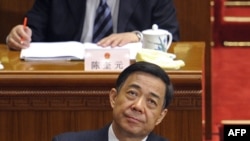Supporters of former Chinese politician Bo Xilai held a small protest outside a courthouse in eastern China where his long-awaited trial begins Thursday.
The protesters, which numbered only in the single digits, were watched closely by police outside the courthouse in Jinan City in Shandong Province. They held signs calling for a fair trial for Bo, who is being tried on charges of corruption, bribery and abuse of power.
One of the men, who refused to be named, told reporters he views the entire case against Bo as illegitimate.
"I think this trial is illegal and we don't recognize any verdict out of this trial, because it is illegal for them to arrest Bo Xilai, and it is not in line with the constitution. We don't accept any trial and verdict."
Another protester, Bao Runpu from northern Hebei province, was more guarded about his opinion, saying Bo's case will be an important barometer of the fairness of China's judicial system.
"Bo Xilai was a member of the Politburo, he was a high official. If his own case isn't carried out fairly, then there's nowhere to go for us average poor people from the lowest level of society. There will never be any hope, nor will we ever be able to get fair or just treatment."
Analysts have said it is virtually certain the 65-year-old will be found guilty. They said the verdict was likely decided beforehand by the top members of China's Communist Party.
Before his downfall, the charismatic Bo attracted a wide following. As party boss of the huge metropolis of Chongqing, he launched a crackdown on organized crime and promoted a nostalgic revival of Maoist ideology and songs.
But his governing style also gained him many enemies, both among the more reform-minded members of the Communist Party and among critics who said his crackdown on the mafia trampled civil rights.
His downfall began last February, when his police chief Wang Lijun fled to the U.S. consulate in Chengdu, where he told American diplomats about Bo's alleged role in covering up the murder of a British businessman.
Bo's wife, Gu Kailai, was later convicted of murdering the Briton over a failed financial deal. Wang, meanwhile, was convicted on charges including defection, abuse of power, and taking bribes.
Bo, meanwhile, has not been seen publicly in 17 months. He was kicked out of the Communist Party in September, when state media accused him of corruption, abuse of power, bribe taking, and "improper" relations with a number of women.
His trial is set to be the most closely watched in the country in decades.
The protesters, which numbered only in the single digits, were watched closely by police outside the courthouse in Jinan City in Shandong Province. They held signs calling for a fair trial for Bo, who is being tried on charges of corruption, bribery and abuse of power.
One of the men, who refused to be named, told reporters he views the entire case against Bo as illegitimate.
"I think this trial is illegal and we don't recognize any verdict out of this trial, because it is illegal for them to arrest Bo Xilai, and it is not in line with the constitution. We don't accept any trial and verdict."
Another protester, Bao Runpu from northern Hebei province, was more guarded about his opinion, saying Bo's case will be an important barometer of the fairness of China's judicial system.
"Bo Xilai was a member of the Politburo, he was a high official. If his own case isn't carried out fairly, then there's nowhere to go for us average poor people from the lowest level of society. There will never be any hope, nor will we ever be able to get fair or just treatment."
Analysts have said it is virtually certain the 65-year-old will be found guilty. They said the verdict was likely decided beforehand by the top members of China's Communist Party.
Before his downfall, the charismatic Bo attracted a wide following. As party boss of the huge metropolis of Chongqing, he launched a crackdown on organized crime and promoted a nostalgic revival of Maoist ideology and songs.
But his governing style also gained him many enemies, both among the more reform-minded members of the Communist Party and among critics who said his crackdown on the mafia trampled civil rights.
His downfall began last February, when his police chief Wang Lijun fled to the U.S. consulate in Chengdu, where he told American diplomats about Bo's alleged role in covering up the murder of a British businessman.
Bo's wife, Gu Kailai, was later convicted of murdering the Briton over a failed financial deal. Wang, meanwhile, was convicted on charges including defection, abuse of power, and taking bribes.
Bo, meanwhile, has not been seen publicly in 17 months. He was kicked out of the Communist Party in September, when state media accused him of corruption, abuse of power, bribe taking, and "improper" relations with a number of women.
His trial is set to be the most closely watched in the country in decades.






